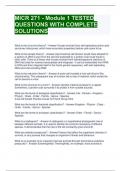QUESTIONS WITH COMPLETE
SOLUTIONS
What is the virus-first theory? - Answer-Viruses evolved from self-replicating amino-acid
structures (ribozymes, which have enzymatic properties) before cells came to be.
What is the escape theory? - Answer-Asymmetrical cell division would have allowed for
a section of DNA to part from the cell and protected by a protein coat could travel to
other cells. There is a theory that viruses evolved from retrotransposons (sections of
DNA that code for reverse transcriptase and integrase - it can be transcribed from RNA
to DNA and then integrate itself in the host's genetic sequence), with self-replicating
DNA and coat encoding RNA.
What is the reduction theory? - Answer-A proto-cell invaded a host cell (kind of like
mitochondria). The subsequent loss of function led to loss of material, which exited the
cell to become a virus.
What is the structure of a virion? - Answer-Genetic material encased in a capsid.
Sometimes, a protein coat surrounds it to protect it from outside sources.
What are the levels of biological classification? - Answer-Life - Domain - Kingdom -
Phylum - Class - Order - Family - Genus - Species.
(Lisa Did Karate Practice Cause Of Friend Group Shit)
What are the levels of bacterial classification? - Answer-Kingdom - Phylum - Class -
Order - Family - Genus - Species
What are the levels of archaean classification? - Answer-Order - Family - Genus -
Species.
What is a cladogram? - Answer-A cladogram is a hypothetical phylogenetic tree in
between different animals. It is used to identify the common ancestors of different
species. It demonstrates that the tree of life will constantly grow and shift.
What are selective pressures? - Answer-Factors that affect the organisms chances of
survival, or any process that changes an organism's fitness and behaviour.
What is an example of an organism that has evolved through tremendous selective
pressures? - Answer-Extremophiles! Thermophiles, for example, have evolved to
, develop traits that favour survival in warm environments. The organisms who have
developed these will outcompete the others, favouring their traits in evolution.
Why are microbes able to live pretty much anywhere? - Answer-Microbes adapt quickly
to any environment through adaptive mutations.
Name four different human microbial phyla. - Answer-1. Actinobacteria (G+, Live in soil,
thick cell wall)
2. Bacteroidetes (G-, Everywhere)
3. Firmicutes (G+, Can form endospores)
4. Proteobacteria (G-, diverse array)
What is the difference in between commensal and pathogenic organisms? - Answer-
Commensal: Symbiotic relationship with host.
Pathogenic: Opportunistic relationship with the ability to cause infection.
Identify two methods of genetic diversity. - Answer-1. Mutations.
2. Gene transfer and genetic recombination
How du mutations lead to evolution? - Answer-Mutations can be spontaneous through
an error in replication or repair or induced by chemical agents. These include insertions,
deletions, point mutations, replacements, and inversions. Most of the time, these are
harmful but they can occasionally be beneficial and confer advantage.
What is the importance of horizontal gene transfer? - Answer-Allows gene sharing in
between different organisms, which can lead to diversity and evolution.
What are the different mechanisms of horizontal gene transfer? - Answer-1.
Transformation: Acquiring naked DNA from ECF and incorporating into the genome.
2. Conjugation: Passing of genetic material from one bacterium to the next.
3. Transduction: Viral implementation of
What is the difference in between bacteria, archaea, and eukaryotes? - Answer-
Bacteria: Single-celled organisms that can live freely or as a parasite.
Archaea: Single-celled organism without a membrane-bound nucleus or organelles.
Eukaryotes: Organism with nucleus and other membrane-bound organelles.
What is a microbe? - Answer-A microbe is a tiny organism that the naked eye cannot
see. Microbes involve many organisms, such as bacteria, viruses, protozoa, and other
organisms. (a microscopic form of life including bacterial, archaeal, fungal, and
protozoal cells)
What does the endosymbiont hypothesis state? What is the supporting evidence? -
Answer-The endosymbiont hypothesis states that eukaryotes evolved from prokaryotes.
The supporting evidence lies in the fact that mitochondria and chloroplasts have their
own DNA and replication systems, similarly to prokaryotes. A symbiotic relationship in




